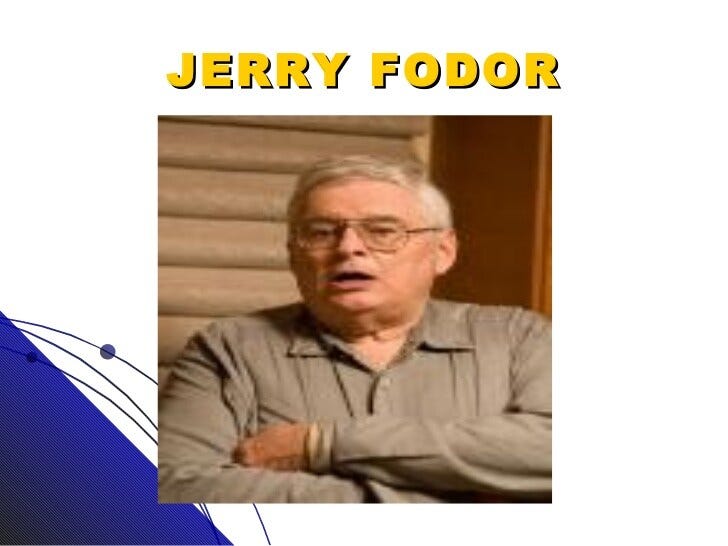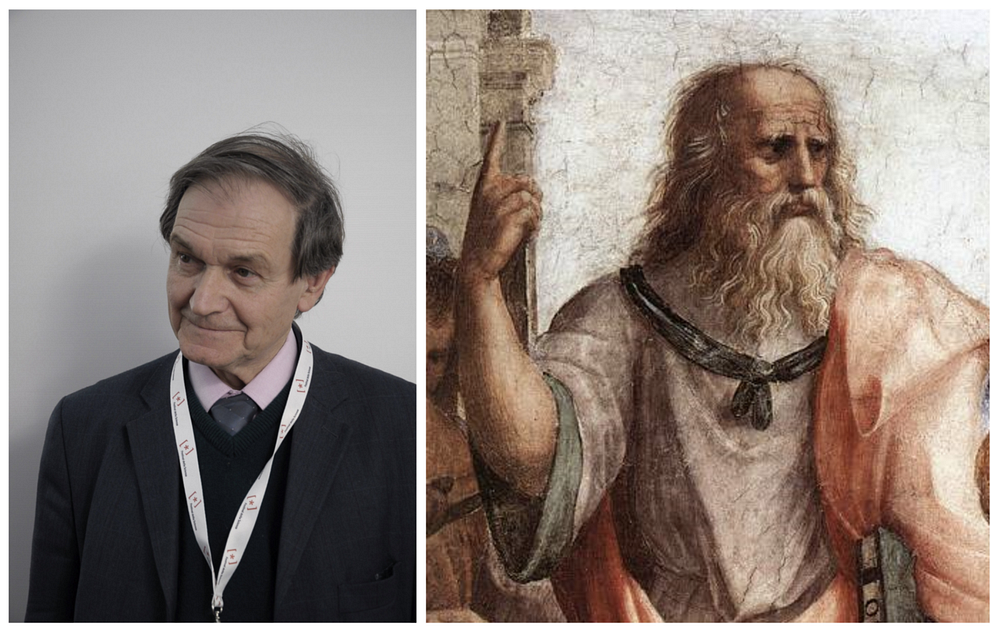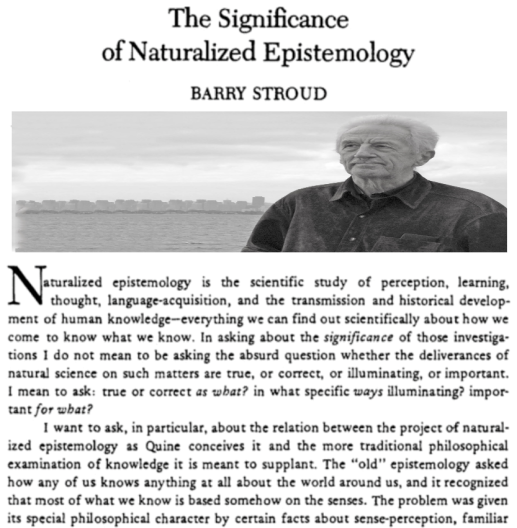Despite the title of this essay, the following piece offers a number of criticisms of that one challenge to physicalism (in the philosophy of mind). In other words, this essay doesn’t itself offer a challenge to physicalism. That said, it does understand and tackle that challenge. And there’s also various attempts to show why philosophers and laypeople may sympathise with it.
That challenge itself is the existence of non-physical or abstract (for want of a better word) phenomena within both physics and physicalist philosophy and how that fact relates to positions taken on the mind or consciousness.
Jeffrey Poland’s Hierarchically-Structured System
Put simply, there are non-physical objects, properties and relations which are quite acceptable to both contemporary physicists and to physicalist philosophers.
Take, as a single example, the following position.
Professor of Science and Technology (at Brown University) Jeffrey Poland puts his case in this way:
“It should be understood that the primacy of physics in ontological matters does not mean that everything is an element of a strictly physical ontology… [physicalism] allows for non-physical objects, properties, and relations… physicalism should not be equated with the identity theory in any of its forms… I prefer the idea of a hierarchically structured system of objects grounded in a physical basis by a relation of realization…”
All the above is quite acceptable on a physicalist picture of the world. That said, does any of the above help in the mind-body problem? Does it somehow justify attacks on physicalist positions on the mind or on consciousness?
In general, physicalists accept the existence of various concepts, properties, objects, etc. which are non-physical. Thus physicalism — generally perceived — can’t be seen as a position which denies the existence of such abstractions.
In addition, most physicists (i.e., rather than physicalists) believe that that certain phenomena supervene on the physical. (Admittedly, supervene — or supervenience — is a word from philosophy which physicists rarely use.) Moreover, because of this acceptance of supervenience, then few physicalists accept that all properties in the world are type identical to physical properties. (Consequently, this often brings about a commitment to what’s called multiple realizability.)
(Supervenience theorists argue that all social, biological and mental properties supervene on physical properties. This means that that two “worlds” can’t be physically identical yet differ in their social, biological or mental properties.)
Despite all the above, the following isn’t meant to be an essay on physicalism itself. However, it must be noted here that physicalism isn’t only a philosophical take on the nature of what is. It’s also often a philosophical position which commits itself to what science (mainly physics) tells us what is. This means that physicalism is strongly tied to naturalism — although they aren’t the same thing. Thus as the Australian philosopher Daniel Stoljar (1967-) puts it:
“[A] property is physical if and only if it either is the sort of property that physical theory [i.e., physics] tells us about or else is a property which metaphysically (or logically) supervenes on the sort of property that physical theory tells us about.”
But now let’s tackle abstract (i.e., non-physical) objects, properties and relations.
Abstract Objects, Properties and Relations
The first thing which should be said is that the non-physical nature of abstract objects, properties and relations aren’t of the same logical order as the ostensibly non-physical nature of mind or consciousness. (That’s if the mind or consciousness is non-physical in the first place.) So surely we can’t say that mind or consciousness is abstract in nature. Of course many accept that the mind is non-spatial. Yet does even the acceptance of that position make mind equivalent to abstract objects like propositions, universals, relations, etc.? Indeed even W.V.O Quine (an arch-naturalist and physicalist) accepted the existence of numbers and mathematics generally. And if anything is an abstract object, then surely a number is! (Of course that too has been disputed.)
This means that Poland’s quote — if used by an anti-physicalist — would actually set up a disanalogy between the abstract objects, properties and relations accepted in physicalist philosophy (as well as in physics) and the ostensibly non-physical nature of mind or consciousness.
In any case, the passage above finishes off with a statement of Poland’s statement that he prefers the
“idea of a hierarchically structured system of objects grounded in a physical basis by a relation of realization”.
This too is acceptable to most philosophers of the physicalist kind. Perhaps, more importantly, it’s also acceptable to scientists because they see meteorology, biology, anthropology, palaeontology, geology, anatomy, etc. as “higher-level sciences” — or at least sciences which study higher-level phenomena.
Or as the philosopher John Heil (1943-) writes:
“If you threw out ‘higher-level’ mental states or properties solely on the grounds that they depend in a mysterious way on lower-level material phenomena, you would have to toss out all the special sciences as well.”
So how does all this concern the scientific and philosophical question of consciousness or mind?
It can be accepted that the sciences mentioned above do grow out of physics. (Of course the phrase “grow out of” is both vague and metaphorical.) Thus chemistry — more directly — grows out of physics. And biology grows out of chemistry (at least to a large extent).
The important point here, however, is that even though chemistry and biology grow out of physics, this isn’t to deny the complexity of this issue and the problems with advancing any naive and simplistic kind of reductionism.
Gell-Mann’s Staircases Between the Sciences
The American physicist and Nobel Prize winner Murray Gell-Mann (1929–2019) once stated the following:
“The laws of biology do depend on the laws of physics and chemistry, but they also depend on a vast amount of additional information about how those accidents turned out.”
Gell-Mann went into further detail:
“In very simple cases, an approximation to QED [quantum electrodynamics] is used to predict directly the results at the chemical level. In most cases, however, laws are developed at the upper level (chemistry) to explain and predict phenomena at that level, and attempts are then made to derive those laws, as much as possible, from the lower level (QED). Science is pursued at both levels and in addition efforts are made to construct staircases (or bridges) between them.”
Today the theoretical physicist Sean M. Carroll (1966-) often stresses the autonomy of science’s higher-level descriptions. (The philosopher Jerry Fodor also focused on what he called the “strong autonomy” of the “special sciences”.) Indeed Carroll advances the “autonomy” of what he calls “emergent theories”. (This is a vital part of his overall “poetic naturalism”.)
Sean Carroll writes:
“The emergent theory is autonomous… it works by itself, without reference to other theories.”
Yet Gell-Mann himself (unlike Carroll who uses the phrases “without reference to other theories”) then went on to tell us why reduction is — despite all the above — a thoroughly scientific method in the following passage:
“I know of no serious scientist who believes that there are special chemical forces that do not arise from underlying physical forces. Although some chemists might not like to put it this way, the upshot is that chemistry is in principle derivable from elementary particle physics.”
In fact Gell-Mann did appear to offer us a middle-way between (strong) reductionism and the complete autonomy of the individual (special) sciences. He believed that it’s all about what he called the “staircases” between the sciences. As Gell-Mann put it (in the specific case of the staircases between psychology and biology):
“Many people believe, as I do that when staircases are constructed between psychology and biology; the best strategy is to work from the top down as well as from the bottom up.”
Interestingly enough, a man who’s often been accused of “reductionism” — the American biologist and naturalist E.O Wilson (1929-) - expressed a similar view in the following:
“Major science always deals with reduction and resynthesis of complex systems, across two or three levels of complexity at a step. For example, from quantum physics to the principles of atomic physics, thence reagent chemistry, macromolecular chemistry, molecular biology, and so on — comprising, in general, complexity and reduction, and reduction to resynthesis of complexity, in repeated sweeps.”
So instead of Gell-Mann’s simplicity and complexity, in this case we have the “reduction” and “resynthesis” of complex systems in “repeated sweeps”.
In addition, the philosopher Patricia Churchland (who classes herself as a “reductionist”) also advances a position which is similar to Gell-Mann’s. In her case, she confronts the neuroscience-versus-psychology binary opposition. And, in so doing, she mollifies people about that scareword “reductionism” by saying that the
“reductionist research strategy does not mean that there is something disreputable, unscientific or otherwise unsavoury about high-level descriptions or capacities per se”.
The words above can be summed up in the following way:
i) Simply because a scientist (or philosopher) says that x can be reduced to y (though not necessarily without remainder),
ii) then that certainly doesn’t also mean that this scientist (or philosopher) also believes that x is (to use Churchland’s words) “disreputable, unscientific or otherwise unsavoury”.
Patricia Churchland then goes on to say something that may surprise some philosophers. She argues that reductionism can exist side-by-side with what she calls “high-level descriptions or capacities”. This too perfectly expresses Gell-Mann’s own position as advanced above.
So how does all the above translate into the case of mind or consciousness?
Gell-Mann himself wrote:
“Where work does proceed on both biology and psychology and on building staircases from both ends, the emphasis at the biological end is on the brain (as well as the rest of the nervous system, the endocrine system, etc), while at the psychological end the emphasis is on the mind — that is, the phenomenological manifestations of what the brain and related organs are doing. Each staircase is a brain-mind bridge.”
So let’s simply rewrite Gell-Mann’s earlier words in this way:
There are no special mental properties which do not arise from underlying physical properties (or facts). Although some philosophers and laypeople may not like to put it this way, the upshot is that the study of mind is in principle derivable from neuroscience and the relevant cognitive sciences; which are themselves dependent on (more fundamental) biology, chemistry and, ultimately, physics.
The problem here is that the reduction of biology to chemistry and of chemistry to physics are of a different logical order to the reduction of mind (or consciousness) to the physical… Or are they?
To rewrite Gell-Mann again:
In very simple cases, an approximation to biology, the brain, etc. is used to predict directly the results at the level of mind or consciousness.
Well, the passage above is the case… in a vaguely analogous sense. That is, from (for want of a better word) happenings in the brain, one can indeed predict what’s going on in the mind (or in consciousness) — at least to some degree of approximation. Of course this is what’s often accused of being “mere correlation”. And because it is seen as being mere correlation, then moving from happenings in the brain to happenings in the mind (or consciousness) isn’t the same as — or even equivalent to — reducing what goes on in the mind (or consciousness) to what goes on in the brain.
Yet the words above almost entirely depend on how we take the word “reduction”. What goes on the the mind can be reduced to what goes on in the brain — but not without remainder. That is, what happens in the mind can be reduced to what happens in the brain in the sense that we can work from the former to the later. That is, the former (mind/consciousness) is — at least partly — explained in terms of the latter (the brain or happenings in the brain). However, the former cannot be said to be identical to the latter . So identity itself is the problem — or at least “identity” is the important word here.
Conclusion
So does the mind or consciousness really grow out of the physical in the same — or even in a similar — way to all these acceptable scientific examples? Are these higher-level states and properties of the special sciences emergent states and properties in the same way in which the states and properties of the mind (or consciousness) are often seen as being emergent?
Most anti-physicalists will argue that this parallel is far from exact.
















